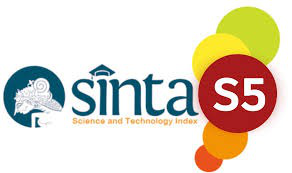Study of the Influence of Online Games on Adolescent Psychology in Parungponteng District: Analysis of Intensity of Use, Type of Game, and Psychological Impact
Abstract
This research aims to examine the influence of online games on adolescent psychology in Parungponteng District. By collecting data from 30 respondents through questionnaires, this research analyzed the intensity of game use, the types of games played, and the psychological impact of online game addiction on teenagers. The research results show that teenagers tend to spend an average of 15 hours per week playing online games, with the majority choosing Role-Playing Games (RPG) and Multiplayer Online Battle Arena (MOBA) games. The psychological impacts of online gaming addiction include a lack of interest in other activities and feelings of anxiety when unable to play. The implications of this research include educational awareness of game use, development of educational games, the active role of parents and educators, as well as the development of time management skills.
Keywords
Full Text:
PDFReferences
Asyiah, A. K., & Sundari, R. S. (2023). Improving the Community's Socio-Economic Quality Through Counseling on the Prevention of Early Marriage. ABDIMAS: Jurnal Pengabdian Masyarakat, 6(3), 4179-4187.
Axmedov, A. (2022). The negative effect of internet gambling on youth psychology. Asian Journal of Multidimensional Research, 11(5), 76-79.
Baggio, S., Dupuis, M., Studer, J., Spilka, S., Daeppen, J.B., Simon, O., Gmel, G. (2016). Reframing video gaming and internet use addiction: Empirical cross-national comparison of heavy use over time and addiction scales among young users. Addiction, 111(3), 513–522.
Ghuman, D., & Griffiths, M. D. (2012). A Cross-Genre Study Of Online Gaming: Player Demographics, Motivation For Play And Social Interactions Among Players. International Journal of Cyber Behavior, Psychology and Learning, 2(1), 13–29.
Jannah, N., Mudjiran, M., & Nirwana, H. (2015). The Relationship between Game Addiction and Student Learning Motivation and the Implications for Guidance and Counselling. Counselor, 4(4), 200–207.
Jap, T., Tiatri, S., Jaya, ES, & Suteja, MS (2013). The development of Indonesian online game addiction questionnaire. Novrialdy 156 Plos One Psychological Bulletin, 8(4), 4–8.
Jordan, C. J., & Andersen, S. L. (2016). Sensitive Periods Of Substance Abuse: Early Risk For The Transition To Dependence. Developmental Cognitive Neuroscience, 25(10), 29–44.
King, D.L., Delfabbro, P.H., Zwaans, T., & Kaptsis, D. (2014). Sleep interference effects of pathological electronic media use during adolescence. International Journal of Mental Health and Addiction, 12(1), 21–35. doi: 10.1007/s11469-013- 9461-2.
Kuss, D. J., & Griffiths, M. D. (2012). Online gaming addiction in children and adolescents: A review of empirical research. Journal of behavioral addictions, 1(1), 3-22.
Lin, S., Yu, C., Chen, J., Sheng, J., Hu, Y., & Zhong, L. (2020). The association between parental psychological control, deviant peer affiliation, and internet gaming disorder among Chinese adolescents: A two-year longitudinal study. International Journal of Environmental Research and Public Health, 17(21), 8197.
Pontes, H. M. (2017). Investigating the differential effects of social networking site addiction and Internet gaming disorder on psychological health. Journal of behavioral addictions, 6(4), 601-610.
DOI: https://doi.org/10.46336/ijeer.v4i1.568
Refbacks
- There are currently no refbacks.
Copyright (c) 2024 Astrid Sulistya Azahra, Jumadil Saputra, Kalfin Kalfin
Published By:
IJEER: Jalan Riung Ampuh No. 3, Riung Bandung, Kota Bandung 40295, Jawa Barat, Indonesia
IJEER Indexed By:
 This work is licensed under a Creative Commons Attribution 4.0 International License.
This work is licensed under a Creative Commons Attribution 4.0 International License.









